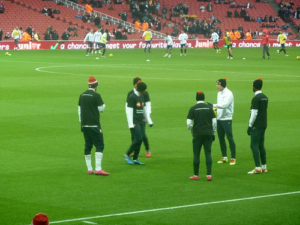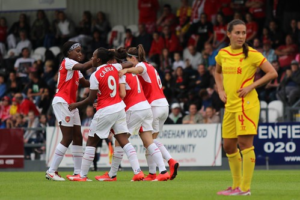The rivalry between Liverpool and Manchester United is arguably the most intense and celebrated in English football, and perhaps even world football. This “North West Derby” transcends the boundaries of sport, deeply ingrained in the social and cultural fabric of both cities and their respective fanbases.
The rivalry between Liverpool FC and Manchester United stands as one of the most intense and storied in football history. Spanning over a century, this fierce competition has been marked by memorable matches, legendary players, and significant cultural implications. This article delves into the origins, historical milestones, recent encounters, and the cultural impact of this iconic rivalry.
Origins of the Rivalry
The Liverpool-Manchester United rivalry, often referred to as the “Northwest Derby,” is deeply rooted in the industrial and economic competition between the cities of Liverpool and Manchester during the 19th century. Liverpool’s status as a major port and Manchester’s industrial prowess fostered a natural rivalry, which seamlessly transitioned into the realm of football. The first official match between the two clubs took place on April 28, 1894, with Liverpool securing a 2-0 victory over Newton Heath, the club that would later become Manchester United.
Historical Milestones
Early 20th Century
In the early 1900s, both clubs began to establish themselves in English football. Manchester United secured their first league title in 1908, while Liverpool had already clinched two league titles by then. The competitive nature of both teams set the stage for a rivalry that would grow in intensity over the years.
Post-War Era
The post-World War II period saw both clubs achieving significant success. Liverpool dominated the 1970s and 1980s under the management of Bill Shankly and Bob Paisley, securing numerous league titles and European trophies. Manchester United, under Sir Matt Busby, achieved European success by winning the European Cup in 1968. The alternating periods of dominance further fueled the rivalry, as each club sought to outdo the other on both domestic and international stages.
Premier League Era
The inception of the Premier League in 1992 marked a new chapter in the rivalry. Manchester United, under Sir Alex Ferguson, dominated English football, securing multiple league titles and surpassing Liverpool’s record of 18 league championships in 2011. Liverpool, despite periods of struggle, maintained their competitive edge, culminating in their Premier League triumph in the 2019-2020 season, ending a 30-year wait for the league title.
Recent Encounters
2023-2024 Season
The 2023-2024 season featured notable clashes between the two sides. In the Premier League match on September 1, 2024, Liverpool secured a 3-0 victory at Old Trafford, with goals from Luis Díaz and Mohamed Salah.
This result highlighted Liverpool’s attacking prowess and Manchester United’s defensive vulnerabilities during that period.
FA Cup Quarter-Final
In the FA Cup quarter-final on March 17, 2024, Manchester United triumphed over Liverpool with a 4-3 victory. The match was a thrilling encounter, with goals from Scott McTominay, Antony, Marcus Rashford, and Amad Diallo for United, and Alexis Mac Allister and Mohamed Salah scoring for Liverpool. This victory propelled Manchester United into the semi-finals, showcasing their resilience and tactical acumen.
Statistical Overview
As of January 2025, Manchester United leads in the head-to-head record with 83 wins to Liverpool’s 72, with 60 matches ending in draws. Both clubs have amassed a total of 68 major trophies each, underscoring the competitive parity that defines their rivalry.
A Historical Perspective:
Roots in Industrial Revolution: The rivalry’s roots lie in the fierce industrial competition between Liverpool and Manchester during the Industrial Revolution. These two cities, separated by a mere 35 miles, were at the forefront of Britain’s economic growth, leading to a natural rivalry that spilled over into the realm of sport.
Early Encounters: While the two clubs have faced each other since the late 19th century, the rivalry truly ignited in the 1960s and 1970s. Legendary managers like Bill Shankly at Liverpool and Sir Matt Busby at Manchester United oversaw periods of intense competition, with both clubs dominating English and European football.
The 1980s and 90s: The rivalry reached new heights in the 1980s and 90s, with both clubs vying for domestic and European supremacy. The era of Sir Alex Ferguson at Manchester United saw them dominate English football, while Liverpool experienced periods of resurgence under managers like Kenny Dalglish and Gérard Houllier.
Key Matchups and Their Significance:
The 1999 Champions League Final: This iconic match saw Manchester United complete an unprecedented treble (Premier League, FA Cup, and Champions League) with a dramatic late comeback against Bayern Munich.
The 2009 Champions League Final: Liverpool, under the guidance of Rafael Benítez, staged a remarkable comeback from 2-1 down to defeat AC Milan on penalties.
Recent Dominance: Liverpool, under Jürgen Klopp, enjoyed a period of dominance in the early 2020s, winning the Premier League and Champions League.
Head-to-Head Statistics:
Manchester United holds a slight edge in the overall head-to-head record.
However, Liverpool has enjoyed recent dominance in the Premier League, with a series of impressive victories.
Key Players and Managers:
Liverpool Legends: Bill Shankly, Bob Paisley, Kenny Dalglish, Steven Gerrard, Mohamed Salah, Virgil van Dijk.
Manchester United Legends: Sir Matt Busby, Sir Alex Ferguson, George Best, Eric Cantona, Cristiano Ronaldo, Wayne Rooney.
Tactical Analysis:
Liverpool: Known for their high-intensity pressing game and attacking flair under Jürgen Klopp.
Manchester United: Historically known for their counter-attacking style and physicality, but recent teams have emphasized possession and attacking football.
The Impact of the Rivalry on Football Culture:
The Liverpool vs. Manchester United rivalry transcends the boundaries of the pitch. It is deeply ingrained in the social and cultural fabric of both cities and has a profound impact on the lives of fans.
Passion and Intensity: The matches are characterized by intense passion and rivalry, with both sets of fans fiercely supporting their respective teams.
Global Reach: The rivalry has a global reach, captivating football fans worldwide.
Cultural Significance: The rivalry has become a significant part of English footballing culture, with its own unique history, traditions, and folklore.
Future Encounters:
The future of the rivalry remains uncertain. Both clubs are constantly evolving, with new players and managers shaping their destinies. However, one thing remains certain: the Liverpool vs. Manchester United rivalry will continue to captivate and inspire for generations to come. It is a timeless clash of titans, a testament to the enduring power of football to unite, divide, and inspire.
FAQs
What is the “North West Derby”?
The “North West Derby” refers to the intense rivalry between Liverpool FC and Manchester United FC, two of the most successful and historically significant clubs in English football.
When did the rivalry begin?
The rivalry has deep roots, dating back to the late 19th and early 20th centuries when both clubs emerged as dominant forces in English football. The proximity of the two cities, Liverpool and Manchester, in North West England further fuels the intensity of the competition.
What are some key statistics of the rivalry?
Overall Record: While the exact head-to-head record fluctuates, Manchester United generally holds a slight advantage in terms of overall wins.
Key Players: Legendary players like Steven Gerrard for Liverpool and Cristiano Ronaldo for Manchester United have significantly impacted the rivalry.
Memorable Matches: Iconic matches include the 1999 Champions League final, where Manchester United staged a dramatic comeback, and the 7-0 victory for Liverpool in 2023, a historic result that sent shockwaves through the footballing world.
What makes the Liverpool vs. Manchester United rivalry so special?
Intense Passion: The rivalry is fueled by the passionate and unwavering support from both sets of fans. The atmosphere at Old Trafford and Anfield during these matches is electric.
Historical Significance: Both clubs boast rich histories, having achieved numerous domestic and international titles.
Social and Cultural Impact: The rivalry extends beyond the football pitch, influencing local communities and even national identity.
To read more,Click Here.





